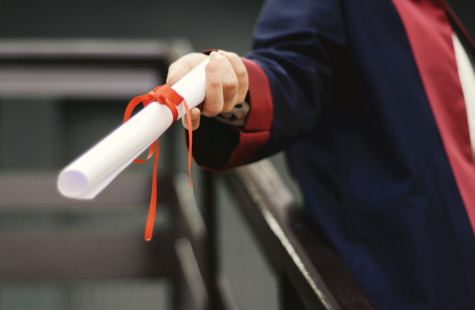Adulting goes beyond college degrees
Feb 4, 2021

One hundred and eight days until graduation. I feel an actual unsettling, almost unbearable, itch to get my shit together. How do I have nearly 18 years of education under my belt, and I feel like I am missing a vital component of being thrown out into the world? The ability to be an “adult.”
College has helped me become educated in a field I am passionate about. Living on my own has taught me to cook an average post-work meal. Just kidding, below average. All I eat is raw fruits and vegetables. I have learned that I need to live in a fresh environment with cleaning supplies always on stand-by. College has taught me to prioritize and to prepare for just about anything. But here is the thing: There are some important things that I do not feel prepared for.

How to pay bills. How to do anything without technology. Anything that has to do with insurance and taxes. How to handle the financial debt we will be bludgeoned with for years to follow. Setting up a bank plan. Time management. Money management. Stress management.
Some people may think that these tasks are tools we should have inherently developed over time in our early years of adulthood. Some may believe healthy time management is a trait we either have or don’t have, that can never be learned. What do I think though? I think that colleges and universities have a great impact on our education and professional development, but there is more to life.
College students are missing out on necessary steps that need to be learned in order to face the real world, not just an office desk. There is essential, everyday knowledge I believe needs to be added into the curriculum to ensure that students are self-sufficient.
I was required to take Professional Communication for my major. I learned about the ins and outs of interview professionalism, digital portfolios and the “thank you” notes that can often close a deal on a job. The professor went as far as to teach us that using a salad fork appropriately at an important function is fundamental. Having my wine glass at the wrong top corner of my place setting was preposterous.
The questions that intimidate me most about being thrown out into the world have nothing to do with my professional career. I have zero concern or care whether, in 10 years, I put a glass in the right corner or get judged for drinking white wine versus red with my dinner.
I am a pinot woman through and through, sorry professor.
I know that I will be okay finding a job. I know that college has prepared me for the interviews, resume prep, office etiquette and networking. Graduation season is upon us. The job exploration begins. I will graciously receive this diploma in 108 days, and yet I feel naive walking out of here.
When I graduate, despite being under the impression that I am “fully prepared” for what is next, am I really ready? The bubble of college is going to pop, and I feel like I have a lot of questions still to ask.
Writing about how, after 18 years of school, I still feel unprepared might make me look silly. But it’s deeper than that.
Uneasiness about our after-college lives does not mean we aren’t prepared. It means there is more to master in life besides what is in the classroom. And we will have to figure it out as we go, I guess.
Books I am ordering to feel more comfort and prepared for post-graduation changes:
“Congratulations, By the Way” by George Saunders
“The Defining Decade” by Meg Jay, PhD
“Option B” by Adam Grant
“In Conclusion, Don’t Worry About It” by Lauren Graham












